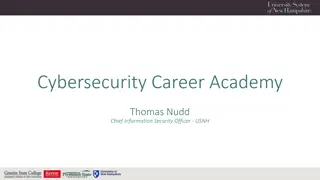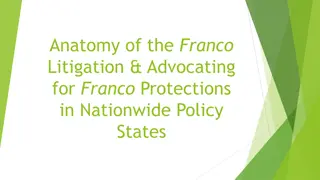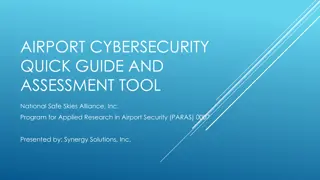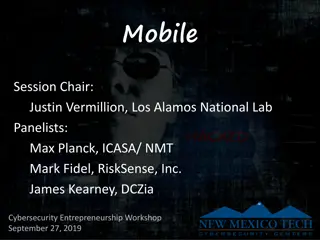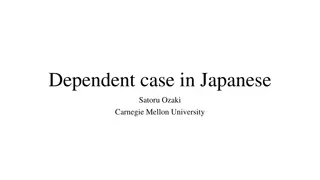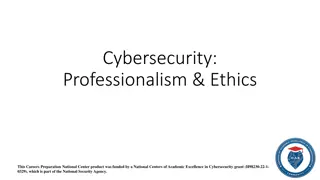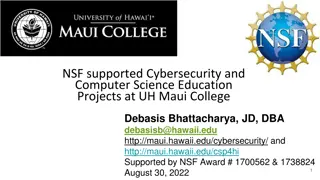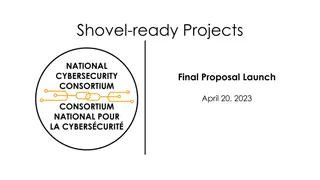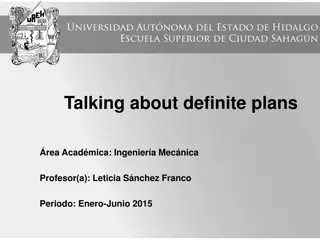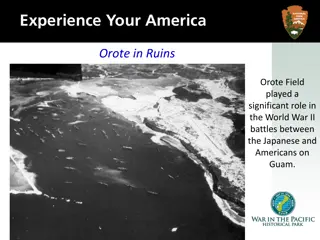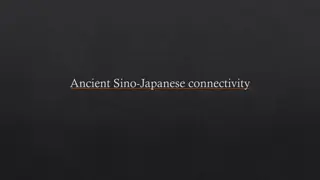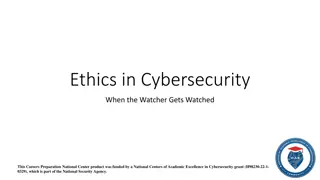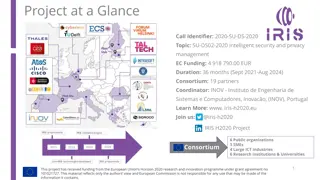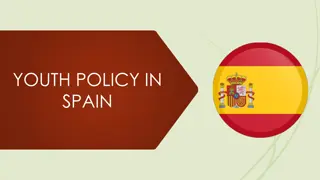Franco-Japanese Cybersecurity Workshop Highlights and Future Plans
The 5th Franco-Japanese Cybersecurity Workshop concluded with insightful discussions on key areas such as IoT security, AI, hardware security, and supply chain security. The steering committee members shared plans for the 6th workshop in France, emphasizing policy discussions and cross-cutting issues. The restructuring of working groups highlighted diverse focuses from cryptographic protocols to secure IoT systems. The event featured presentations on formal verification of cryptographic protocols, deep learning in logic synthesis, security properties expression, private data applications, and statistical security in machine learning. These discussions pave the way for future collaborations and advancements in cybersecurity.
Download Presentation

Please find below an Image/Link to download the presentation.
The content on the website is provided AS IS for your information and personal use only. It may not be sold, licensed, or shared on other websites without obtaining consent from the author.If you encounter any issues during the download, it is possible that the publisher has removed the file from their server.
You are allowed to download the files provided on this website for personal or commercial use, subject to the condition that they are used lawfully. All files are the property of their respective owners.
The content on the website is provided AS IS for your information and personal use only. It may not be sold, licensed, or shared on other websites without obtaining consent from the author.
E N D
Presentation Transcript
5th Franco-Japanese Cybersecurity workshop Final Panel Wrap up
Steering committee Nakao Koji <ko-nakao@nict.go.jp> Okada Mitsu <mitsu@abelard.flet.keio.ac.jp> Murai Jun <jun@wide.ad.jp> Capp Olivier <olivier.cappe@cnrs-dir.fr> Kirchner Claude <claude.kirchner@inria.fr> Kirchner Helene <helene.kirchner@inria.fr> Nguyen Phong <phong.nguyen@ens.fr> Salamatian Kav <kave.salamatian@univ-savoie.fr>
Wrap Wrap- -up Summary of each WG activity : WG1 WG8; up Plan to hold the 6th F/J Cybersecurity workshop (3 days) in France. To hold policy discussion as well. Candidate dates are April 27-30, 2020 in France; During discussion, we did recognize the following cross-cutting issues which are related to several WGs for our considerations: Secure IoT system; AI (Machine Learning, Deep Learning ); Hardware (component) security vs system security (WG4 and WG6); Supply chain security and so on.
Restructuring WGs Restructuring WGs WG1 Cryptographic Protocol Verification/Privacy by Formal Methods WG2 Lattice-based cryptography / Post-quantum cryptography WG3 Events collection by sensor technologies and exchange for joint analysis of attack events with malware WG4 Countermeasure against Side Channel Attacks (it was System Security and IoT) WG5 Technologies on Sanitization, Generalization and Data Mining for privacy preservation WG6 Secure IoT systems for critical services (ICS/ITS) WG7 <Network, network security, measurement> Virtualization, SDN security, including measurement of security performance and effectiveness WG8 (cyber-norms and international cooperations on cybersecurity) Any other WGs
WG1 WG1 Cryptographic Protocol Verification/Privacy by Formal Methods 13:30-13:45 Mitsuhiro Okada (Keio University) French-Japanese collaboration on formal verification of cryptographic protocols and on algorithmic ethic 13:45-14:15 Kohei Suenaga (Kyoto University) Automated proof synthesis for propositional logic using deep learning 14:15-14:45 Virgile Prevosto and Virgile Robles (Institut LIST, CEA) MetACSL, A Frama-C plug-in for expressing security properties 14:45-15:10 Ehab ElSalamouny (Inria) Applications of the Expectation- Maximization framework to private data 15:10-15:30 Yusuke Kawamoto (AIST) Epistemic logic for expressing the statistical security of machine learning
WG1 activites Formal method for protocol verification based computational complexity theory Formal method for privacy based on information theory Towards combination of ML and formal logic 4 mutual visits, 10 people (4 French and 6 Japanes) 2019 Jan. our INRIA-associate team LOGIS renewed for the next 3 years.
WG3 WG3 Events collection by sensor technologies and exchange for joint analysis of attack events with malware 13:30-13:50 Mizuhito Ogawa (JAIST) Generation of Dynamic Symbolic Execution Tool for ARM from Natural Language Specification 13:50-14:10 S bastien Bardin (CEA) Automated Deobfuscation: Where Are We? 14:10-13:30 Ryoichi Isawa (NICT) A Feasibility Study on a Firmware-Updating Scheme for IoT Devices 14:30-14:50 Jean-Yves Marion (Loria, Universit de Lorraine, Institut Universitaire de France) Detection of Compiler Versions and of CVE 14:50-15:10 Bo Sun (NICT) A Scalable and Accurate Feature Representation Method for Android Malware Detection 15:10-15:30 Discussion WG3 conducted fruitful technical discussions regarding:- Dynamic Symbolic Execution and Symbolic Deobfuscation- Vulnerability Detection in Software Library- Firmware- Updating Scheme for IoT Devices- Android Malware Detection with Machine Learning. For further collaboration:- WG3 will hold an interim meeting on Sep or on Oct in Paris or in Nancy- WG3 is looking for an appropriate joint budget to apply our joint research
WG4 WG4 Countermeasure against Side Channel Attacks (it was System Security and IoT) 13:30-13:50 Ludovic Claudepierre (Inria) TRAITOR: a multi clock-glitch attack platform reproducing EMI effects at low cost 13:50-14:10 Keito Dan (Kobe Univ.) Proposal of DoS attack against LoRAWAN and its countermeasure 14:10-14:30 Leopold Ouairy (Inria) Using Articifial Intelligence to protect systems against fuzzing attacks 14:30-14:50 Makoto Ikeda (Tokyo University) Advanced Cryptographic Hardware designs 14:50-15:10 Kazuhide Fukushima (KDDI) Experiment on Side-Channel Key-RecoveryUsing a Real LPWA End-Device 15:10-15:30 Title TBC (by Secure-IC, France) We had 6 presentations which introduced state-of-the-art research topics about physical attacks on software/hardware components and countermeasures against the attacks, and confirmed that researchers in WG4 shares some interests in those technical topics. As a result of discussion in WG4 session, it was suggested that the scope of WG4 would be a bit broader and the scope might be overwrapped with scopes of other WGs. So, we propose that the scope of WG4 would be changed as "Security of Components in Cyber Physical Systems"; WG4 would focus on security aspects of each components, not overall system security. A joint session with WG4 (component security) and WG6 (system security) would be proposed in the next workshop as well.
WG5 WG5 Technologies on Sanitization, Generalization and Data Mining for privacy preservation 13:30-13:35 Hiroaki Kikuchi (Meiji University), Welcome remark 13:35-14:00 Koki Hamada (NTT), Data anonymization competition PWSCUP 2018 14:00-14:25 Takao Murakami (AIST), Plan to anonymization competition for location privacy 14:25-14:50 Baptiste Olivier (Orange Labs), From research to applications of privacy- enhancing technologies 14:50-15:15 S bastien Gambs (UQAM), Privacy-preserving WiFi analytics 15:15-15:30 Discussion
WG6 WG6 Secure IoT systems for critical services (ICS/ITS) 13:30-13:45 Koji Nakao (NICT) Introduction of this session (WG6) 13:45-14:30 Assia Tria (CEA) Introduction of M-SEC F/J project including a test platform (P-SCAN) (two presentations) 14:30-14:45 Koji Nakao (NICT) Securing IoT system for ITS environment (mainly for automotive environment) 14:45-15:15 Koji Nakao (NICT) Cyber-Physical security framework discussed in METI (Japan) 15:15-15:30 Discussion Discussion Agreed to continue exchanging technical materials related to WG6; WG6 has still an impression that its scope is a bit broad and not well sharpened; As for the issue on IoT security, there are many connections with other WGs; An idea to hold an intermediate workshop on the topics related to WG6 can be the next good action for WG6. The detailed idea for the intermediate workshop (before the next F/J cybersecurity workshop) should be discussed at the Wrap-up session.
WG7 WG7 <Network, network security, measurement> Virtualization, SDN security, including measurement of security performance and effectiveness 13:30-13:40 Opening Remarks 13:40-14:00 Razvan Beuran (JAIST) Cybersecurity Education and Training: Progress and Perspectives 14:00-14:20 Keichi Shima (IIJ) How AI can support SOC operators 14:20-14:40 Mustafizur Shahid (Telecom SudParis) Machine Learning for IoT Network Monitoring 14:40-15:00 Thomas Silverston (Shibaura Institute of Technology) Detecting IoT Traffic Anomalies in Smart Home Environment 15:00-15:30 Discussions
WG8 Cyber yber- -norms and international cooperation on cybersecurity norms and international cooperation on cybersecurity 13:30-13:45 Kav SalamatianIntroduction to the session (WG8) 13:45-14:15 Alix DesforgesComparative analysis of French and Japan Cybersecurity framework 14:15-14:45 Colin GerardThe structure of Russian Disinformation campaigns 14:45-15:15 Kav SalamatianHuawei 5G controversy updates 15:15-15:30 Discussion
Next Actions Next Actions intermediate workshop intermediate workshop The annual meeting of the F/J cooperation on cybersecurity held at springtime alternatively in France and in Japan. This 2 days intermediate workshop has for purpose to rapidly share and organize our cooperation on several specific topics of cybersecurity such as Supply-chain, IoT and AI. How about a satellite meeting on informatics ? The intermediate workshop can be sharped as follows: Semi-Closed Workshop (interim workshop), Schedule: 2 days in 2019 (between 5th and 6th Workshop). Candidate dates are November 4-5; Plan (tentative): The first day for sharing technical materials, the second day for specific WGs discussion in depth. Venue: France Topics: Supply chain security, Secure IoT systems and AI & Cyber Security (detailed topics should be clarified through WGs email discussion)



